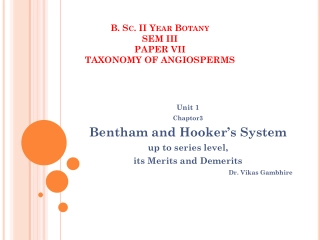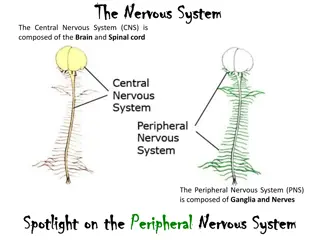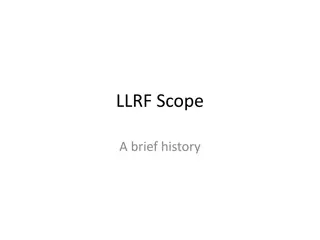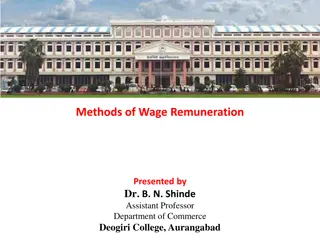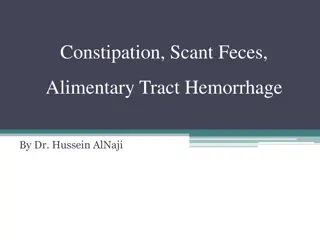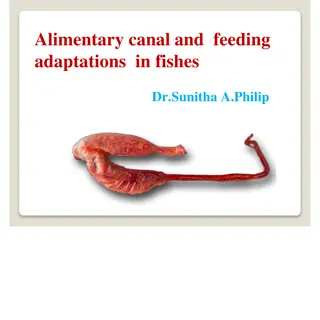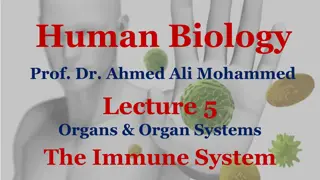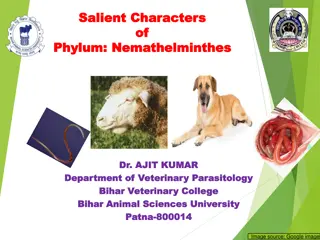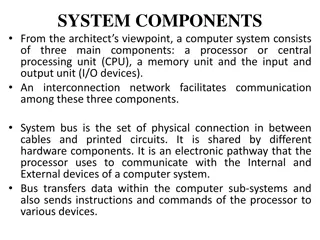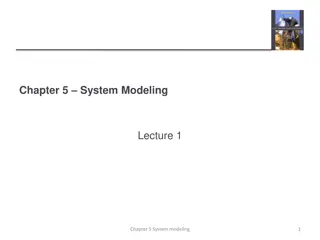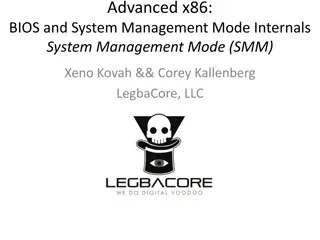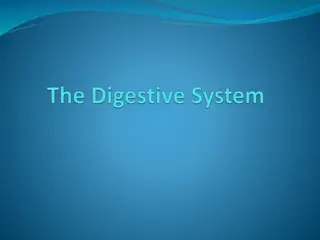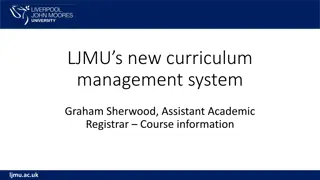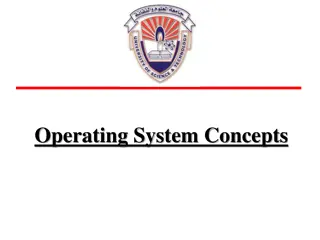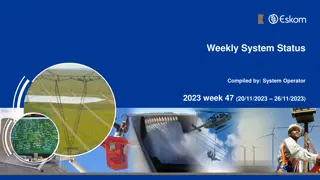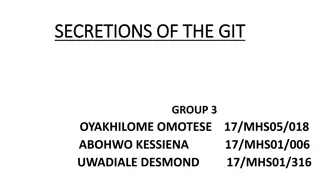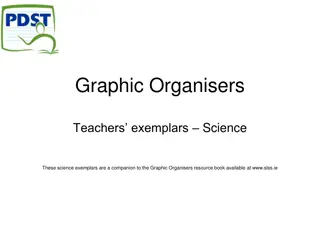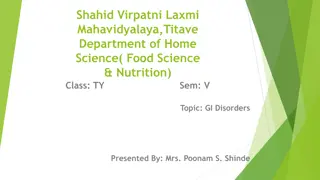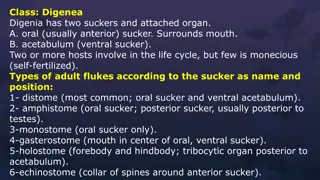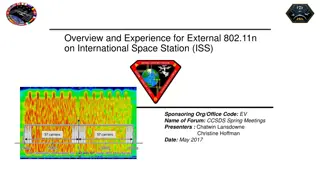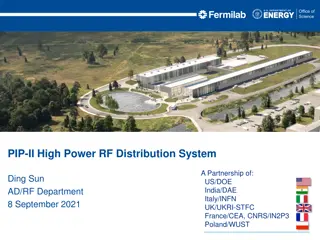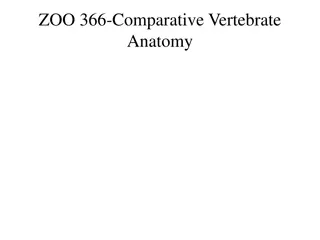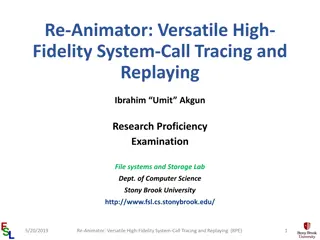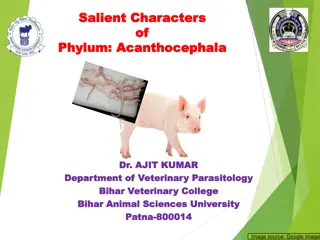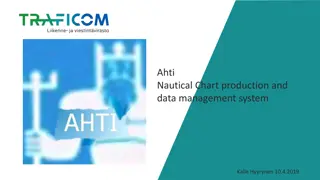Bentham and Hooker's System of Classification in Botany
Bentham and Hooker's system of classification in botany is a natural system based on a large number of characters considered simultaneously. Proposed by British taxonomists George Bentham and Joseph Dalton Hooker, this system categorizes seed plants into classes, orders, families, and genera. It is
2 views • 10 slides
Overview of ESRF-EBS 352 MHz RF System Upgrade at 26th ESL RF Meeting
The 26th ESL RF Meeting held at Elettra in Trieste discussed the status and upgrades of the ESRF-EBS 352 MHz RF system. The meeting covered topics such as the EBS RF layout, HOM damped cavities, RF ECO-Mode, ongoing RF projects, and the replacement of klystrons with SSAs for a 4th harmonic RF system
0 views • 16 slides
adonai software
Adonai college Management System is a cloud-based ERP System that delivers various College and School Management Systems, College and School Management Software, College and School Management System ERP, College and School Management Software System, Online College and School Management Software Sys
3 views • 1 slides
System Models in Software Engineering: A Comprehensive Overview
System models play a crucial role in software engineering, aiding in understanding system functionality and communicating with customers. They include context models, behavioural models, data models, object models, and more, each offering unique perspectives on the system. Different types of system
3 views • 33 slides
Understanding the Nervous System: CNS, PNS, SNS, and ANS
The nervous system comprises the Central Nervous System (CNS) and Peripheral Nervous System (PNS), with the PNS further divided into the Somatic Nervous System (SNS) and Autonomic Nervous System (ANS). The SNS controls voluntary movements of skeletal muscles, while the ANS regulates involuntary proc
2 views • 23 slides
The muscular system
The muscular system is a vital organ system that includes smooth, skeletal, and cardiac muscles. It plays a crucial role in locomotion, supporting the cardiovascular system, enabling lung ventilation, regulating fluids, maintaining posture, and generating heat in the body. This system consists of ar
2 views • 16 slides
Understanding Control Systems in Ergonomics Macro
Control systems play a vital role in regulating and managing various processes within different industries. This content delves into the fundamentals of control systems, discussing terms like input, output, plant, process, system, open-loop system, closed-loop system, transfer function, feedback con
7 views • 15 slides
Overview of LLRF Scope and Development
The LLRF system is responsible for controlling the phase and amplitude of cavities in the linac system. The cost book details the budget for implementing the LLRF system in 155 systems. Adaptations were made to the PEG for delivering and installing the LLRF systems. A schedule outlines the developme
0 views • 8 slides
GDS System
Travelopro Global Distribution System (GDS) is a computerized network system. It is a large computer network which is integrated with 100 of worldwide Airlines and consolidators for enabling transactions between travel agents and travel sites and also used by airlines, hotels, car rentals, railways
4 views • 15 slides
Airline Ticket Reservation System
Travelopro offers a state-of-the-art airline ticket reservation system with a modern, scalable and robust reservations architecture. The airline ticket reservation system has transformed the way people plan and book their flights. This system is designed to make the process of reserving airline tick
2 views • 15 slides
Wage Remuneration Methods Overview
Dr. B. N. Shinde, Assistant Professor at Deogiri College, Aurangabad, presents an insightful overview of methods of wage remuneration including Time Rate System, Piece Rate System, and Combination of Time and Piece Rate System. Time Rate System is the oldest method where workers are paid based on ti
0 views • 16 slides
Understanding constipation, scant feces, and alimentary tract hemorrhage in farm animals
Constipation in farm animals is characterized by decreased frequency of defecation and dry, hard feces. Scant feces are small quantities of feces, commonly seen in animals with stomach abnormalities. Alimentary tract hemorrhage can result from various causes, including ulcers and infestations. Hemor
0 views • 12 slides
Alimentary Canal and Feeding Adaptations in Fishes by Dr. Sunitha A. Philip
The presentation discusses the alimentary canal and feeding adaptations in fishes, covering topics like the different regions of the gut, mouth types in fish, adaptation of teeth for specific diets, and the roles of the buccal cavity, pharynx, and gill rakers. It further explores how gill rakers var
0 views • 24 slides
Understanding the Immune System: Organs, Functions, and Importance
The immune system acts as a defense mechanism against pathogens and infections, comprising various organs, such as the bone marrow, thymus, spleen, white blood cells, antibodies, complement system, and the lymphatic system. It works to recognize and destroy harmful microbes, maintaining the body's h
1 views • 23 slides
Evolution of Land Law Systems in Trinidad and Tobago
Trinidad and Tobago's land law systems consist of the Common Law System and the Registered Land System. The Common Law system governs unregistered land where title passes upon execution and delivery of the deed. In contrast, the Registered Land System confers ownership upon registration and offers c
0 views • 28 slides
Overview of Nemathelminthes: Salient Characters and General Characteristics
Nemathelminthes, a phylum of eukaryotic organisms, include parasites such as helminths. This summary covers the salient characters and general characteristics of Nemathelminthes, focusing on the classes within this phylum, like Nematoda. The description highlights key features like body shape, prese
0 views • 15 slides
Understanding Computer System Buses: Components and Functions
A computer system comprises three main components - the CPU, memory unit, and I/O devices connected via an interconnection network, facilitated by the system bus. System buses reduce communication pathways, enabling high-speed data transfer and synchronization between components. Internal buses conn
3 views • 55 slides
Understanding System Modeling in Engineering
System modeling in engineering involves developing abstract models to represent a system from various perspectives using graphical notations like UML. These models aid in understanding system functionality, communicating with stakeholders, and documenting requirements for new systems. Existing and p
2 views • 53 slides
Rapid Identification System for Inmate Release
The Rapid Identification System, also called Rapid ID System, provides a quick way to verify an inmate's identity using fingerprints before release from custody. It allows law enforcement agencies, including IPD users under SDSheriff, to log in and access the system. By searching the San Diego AFIS
3 views • 8 slides
Understanding System Management Mode (SMM) in x86 Processors
System Management Mode (SMM) is a highly privileged mode in x86 processors that provides an isolated environment for critical system operations like power management and hardware control. When the processor enters SMM, it suspends all other tasks and runs proprietary OEM code. Protecting SMM is cruc
1 views • 26 slides
Revolutionizing Paper Mill Operations with AutoRate System by P.L.C
AutoRate system by P.L.C offers a superior alternative to manual feed rate control in paper mills, addressing issues of operator variability and inconsistent system responses. By utilizing a Virtual Controller based on inherent system values, the system enhances overall consistency and efficiency, r
2 views • 12 slides
Overview of the Gastrointestinal System and Its Functions
The alimentary tract supplies the body with water, electrolytes, and nutrients through processes like movement of food, digestion, absorption, and circulation. The gastrointestinal tract, starting from the mouth to the anus, is aided by accessory organs for digestion. Functions include motility, sec
0 views • 29 slides
Understanding the Secretory Functions of the Alimentary Tract
This content delves into the secretory functions of the alimentary tract, focusing on the secretion of saliva and the role of mastication. It covers the anatomy of salivary glands, composition of saliva, control of secretion by the nervous system, and the functions of saliva in lubrication, protecti
1 views • 30 slides
LJMU's New Curriculum Management System Project Overview
LJMU's new curriculum management system project aims to streamline course information production and storage by implementing the Courseloop system. The project timeline includes releases for data governance, migration, testing, and training leading up to the system's go-live in September 2022. The p
1 views • 8 slides
Understanding Operating System Concepts: Lecture Overview and Services
Exploring the lecture content on operating system concepts, structures, services, system calls, and file manipulation. Delve into the importance of operating system services, error detection, program execution, I/O operations, protection, security, and resource allocation in operating systems. Learn
4 views • 26 slides
System Sequence Diagrams: Understanding Artifact for System Behavior
System Sequence Diagrams (SSDs) are vital artifacts that visually illustrate input and output events related to a system. They help define system behavior and interactions, making them essential during the logical design phase of software applications. By depicting events in sequential order, SSDs o
2 views • 24 slides
Weekly System Status Update: Adequacy of National Electricity Supply (Week 47, 2023)
This weekly system status report compiled by the System Operator provides insights into the National Electricity Supply System's adequacy in the medium term. It includes data on historic daily peak system capacity/demand, available dispatchable generation, operating reserve margin, forecast vs. actu
1 views • 14 slides
Understanding the Secretions of the Gastrointestinal Tract (GIT)
The gastrointestinal tract (GIT) is responsible for digestion, absorption, and secretion through various glands along the alimentary canal. Secretions are stimulated by factors like direct contact, nervous system activation, and hormonal regulation. Hormones released in response to food presence hel
0 views • 7 slides
Science Exemplars: A Companion to Graphic Organisers Resource Book
Explore science exemplars covering topics such as water treatment, plant reproduction, titration, digestion stages, organism organisation, scientific method, alimentary canal, microscopic study of plant cells, chemistry concepts, growing bacteria, and oxygen gas production. These exemplars provide p
0 views • 55 slides
Overview of UNIX System Protection
UNIX System Protection focuses on ensuring security and access control mechanisms within the UNIX operating system. Developed in 1969 by Dennis Ritchie and Ken Thompson at AT&T Bell Labs, UNIX features design elements like a portable API, protection rings, kernel processes, and a trusted computing b
0 views • 12 slides
Understanding Peptic Ulcers: Causes, Symptoms, and Nutritional Management
Shahid Virpatni Laxmi Mahavidyalaya conducted a presentation on gastrointestinal (GI) disorders, focusing on peptic ulcers. The content covers the etiology, symptoms, and nutritional management of peptic ulcers, emphasizing the importance of proper diet in managing this condition. Peptic ulcers, cha
0 views • 8 slides
Anatomy and Biology of Class Digenea Digenia Adult Flukes
Digenea Digenia, a class of parasitic flatworms, have distinctive anatomy and biology. Adult flukes possess two suckers, oral and acetabulum, and exhibit different types based on sucker positioning. Their tegument consists of two zones, with various chemicals for survival. The alimentary tract is in
0 views • 14 slides
Overview of External Wireless Communication System on International Space Station (ISS)
This presentation covers the overview and experience of implementing an external 802.11n wireless communication system on the International Space Station (ISS). It discusses the existing wireless system, committed users, system architecture, and future challenges. The system provides high data rate
0 views • 18 slides
PIP-II High Power RF Distribution System Overview
The PIP-II High Power RF Distribution System is a collaborative project involving various countries and institutions to develop a sophisticated system capable of efficiently distributing RF power to superconducting cavities. The system consists of multiple distribution lines and components designed
0 views • 28 slides
Comparative Vertebrate Anatomy - Alimentary System Overview
The alimentary system in vertebrates undergoes invagination to form a stomodeum and proctodeum, with tissue of mesodermal origin forming the wall of the alimentary canal. Differentiated into regions, the canal includes the buccal cavity, pharynx, esophagus, stomach, and intestine. The system is cruc
0 views • 93 slides
Long-Baseline Neutrino Facility (LBNF) Primary Beamline LCW System Overview
The Long-Baseline Neutrino Facility (LBNF) Primary Beamline Low Conductivity Water (LCW) System comprises various technical design aspects including system operational scope, major system updates, design requirements, and component summary. It involves the provision of LCW cooling for magnets and po
0 views • 14 slides
Re-Animator: Versatile System Call Tracing and Replaying
Re-Animator is a research project focusing on creating a high-fidelity system call capturing system with minimized overheads. The project aims to capture long-running applications and provide scalable and verifiable system call replaying. It introduces two prototype system call tracing systems and h
0 views • 39 slides
Strategies for Enhancing Extended Producer Responsibility System in Bulgaria
Korea-Bulgaria Knowledge Sharing Program focused on sharing strategies to enhance Bulgaria's Extended Producer Responsibility (EPR) system. The program discusses the current status, performance evaluation, issues, and recommendations related to the EPR system in Korea. It covers topics like beverage
0 views • 38 slides
Salient Characters and General Features of Phylum Acanthocephala
Discover the salient characters and general features of Phylum Acanthocephala, a group of parasitic organisms with unique anatomical characteristics. Explore the body structure, presence of a retractable proboscis, absence of body segmentation and alimentary canal, as well as the lack of certain org
0 views • 10 slides
Ahti Nautical Chart Production and Data Management System Overview
Ahti Nautical Chart Production and Data Management System, led by Kalle Hyyrynen, aims to modernize nautical chart production by utilizing standardized products, improving system technology, and enhancing data management. The project addresses challenges such as outdated technology, integration need
0 views • 7 slides
